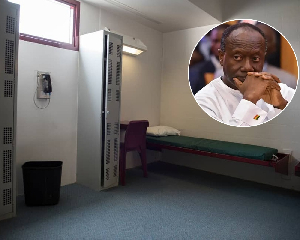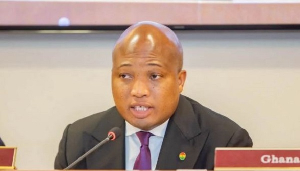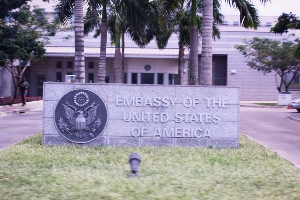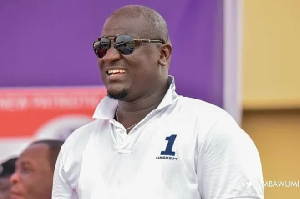'I will not pay bribe,
I will not seek bribe
I will work with others to campaign against corruption
I will speak out against corruption and report on abuse
I will only support candidates for public office who say no to corruption and demonstrate transparency, integrity and accountability'
–Transparency International Declaration Against Corruption
Graphic reports about corruption in the judiciary following the investigative work by ace investigative journalist, Anas Aremeyaw Anas did not come as a surprise to the Ghana integrity Initiative (GII), the Ghana chapter of the Transparency International (TI), the global coalition in the fight against corruption worldwide. Past research works by GII have proved conclusively that there is massive corruption in the judiciary. However, any such pronouncements have been met by some judges with contempt and threats and challenges for evidence.
As far back as in the late 1980s a workshop conducted at the State House dealing with the judiciary received many muted reports of corruption within the judiciary. However for the fear of finding themselves behind bar and coupled with spirited denunciation of such reports by some judges, very little came out of the workshop. Today the well-kept secret has its lid blown off. Anas must be congratulated.
This year, between Monday August 31, 2015 and Friday September 4, 2015, two important events were held in Putrajaya, the plush and modern administrative capital of Malaysia. The first two days were used by the TI to conduct its Annual Membership Meeting (AMM) while the following three days were used for the 16th International Anti-Corruption Conference.
The three-day conference, which began on September 2, was held at the Putrajaya International Convention Centre. The conference was declared closed by the Minister in the Prime Minister’s Department, Datuk Seri Abdul Wahid Omar. Mr. Omar was once the Chief Executive Officer of Malaysia Telecom. I had a short interaction with him and he told me had visited Ghana before and met President Kufuor.
The conference was held under the theme 'Ending Impunity.' GII was represented by its Board Chair, Kwame Gyasi and the Executive Director, Vitus Azeem. Madam Ana Bossman of the African Development Bank presented a paper as well as acted as a member of a panel at one of the plenary sessions. Dan Batidam, the President's advisor on governance and corruption was also present.
During two of those occasions many pertinent issues dealing with corruption were discussed. Ironically two of the topics on board were 'Six charges to improve whistleblowing overnight' and 'Investigating corruption: the new muckrakers'. At the sessions the dangers facing and the safety of investigative journalists were discussed. I am therefore not surprised that Nana Kwaku Bonsam has promised to use his powers to protect Anas against all those who plot evil against him. Incidentally, the meetings took place at a time when the Prime Minster of Malaysia was under intense storm to explain how and the sources of the US$700 million which landed in his account. The people of Malaysia including a former Prime Minister are calling for his scalp.
TI launched its Strategy 2020 dubbed 'People Against corruption', its blueprint for its fight against corruption during the next five years. A number of resolutions were also passed at the end of the two meetings. The following statements capture the spirits of the two meetings in declarations passed:
Putrajaya Declaration: Zero Tolerance for Impunity
'Nearly 1,200 people from 130 countries gathered in Putrajaya, Malaysia to discuss one of the world's biggest challenges: how impunity enables the spread of corruption. Delegates came together to find the most effective strategies to stop impunity and hold to account those who benefit from the abuse of power, secret deals and bribery. Governments plagued by cronyism, leaders who rewrite constitutions to extend term limits, fragile democracies captured by special interests create a climate where corruption flourishes and impunity prevails. Impunity feeds grand corruption: the abuse of high-level power that benefits the few at the expense of the many, causing serious and widespread harm to individuals and society.'
'When the International Anti-Corruption Conference last met in Brasilia in 2012, the rallying cry was 'Don't let them get away with it!' - a statement that still rings true today for those who seek to stop the thieves, criminals and others who steal national wealth, enable organised crime to flourish and provide safe haven for tax evaders and hiding for terrorists. Today around the world we see that corruption manifests itself at the highest levels of political power and business. It is essential to ensure that investigative and judicial bodies remain independent and autonomous. It is essential that threats against civil society be stopped and the voice of the people encouraged.
Now more than ever we must all come together to promote integrity and take action in a concerted effort against the abuse of entrusted power.'
'In politics, in education, in business, in the media, in sports, at the national level and in global institutions, corruption denies people a voice. It worsens lives and muzzles justice.
It takes courage and collective action to ensure that those with power who commit crimes are brought to justice. People in government, civil society, the private sector, young people and social innovators must join to build innovative anti-corruption, transparency and accountability solutions to end impunity and corruption. If the powerful and corrupt are allowed to escape justice, we risk the collapse of the rule of law and the ultimate disintegration of society. We risk losing the fight against corruption. We need a culture of integrity in all sectors of society to achieve sustained, positive change.'
'We need people with integrity taking action together against impunity that enables the spread of grand corruption. There is no either-or relationship between systemic reforms and no impunity, a lack of reform will only encourage the corrupt.
'In Putrajaya we declared the need for numerous actions to prevent corruption, to stop corruption, to make sure corrupt acts are not repeated and to ensure the corrupt not only feel the full force of the law but fully repay their debts to society.'
'Asset recovery is essential because it restores the trust of the people and constitutes a sanction that reduces the incentive for corruption and at the same time compensates for the damage caused. Stronger legal frameworks and an enhanced rule of law create more equal access to justice which is an essential component of citizens' trust in the functioning of the state. Returning stolen assets to their original purposes, often serving to compensate victims also restore peoples' trust in the justice system'.
Opinions of Monday, 14 September 2015
Columnist: Daily Guide















